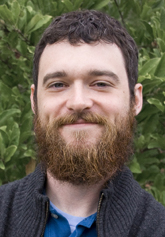 Will Meek, PhD is a Vancouver, Washington-based therapist who has carved out a niche working with “The Psychology of Men.” He talked to WTCI via email about what that means and what he does.
Will Meek, PhD is a Vancouver, Washington-based therapist who has carved out a niche working with “The Psychology of Men.” He talked to WTCI via email about what that means and what he does.
What’s your background? What do you do now?
I grew up in the Cleveland Ohio metro, went to Baldwin-Wallace College where I majored in psychology and then got my PhD in counseling psychology from the University of Missouri-Kansas City. The early part of my training focused on cognitive-behavioral therapy, but has since expanded to be integrative. Essentially, I try to create a life changing experience while helping with immediate problems. .
I am currently employed full time as a psychologist at Washington State University Vancouver, where I run our small counseling center. This essentially means I run the training program, the outreach program, see a full case load of clients, and work on our students of concern committee and am part of the campus Diversity Council. I also teach at Portland State University in the Masters in counseling program. Additionally, I have a private practice in Vancouver, Washington, which I feel quite passionate about. As of this interview the practice is still in its infancy, but I am quite excited about the direction it is going.
Right now I am putting a lot of time into developing my new blog: Vancouver Psychologist. I have written online in some form or another for the past 10 years, and I think this is my best yet. I am also in the process of beginning a research program on psychology of men, which will be centered on another site I have: Psychology of Men. Working with male clients is a specialty of mine, and I think I have some fresh ideas on the subject to share.
What was the biggest surprise in going into private practice?
Insurance! Despite being pretty educated as a consumer of health insurance, being on the provider side was quite a surprise. I heard horror stories from supervisors and mentors during my training, but the reality of dealing with insurance is unbelievable. It takes a very diligent clinician to keep track of all the money he is owed, how the deductibles work for each client, and follow up with session authorizations.
How did you first get interested in the psychology of men?
My first spark of interest came when I realized in my mid-20s that I had never really thought about what it meant to be a “Man.” This was likely the result of some form of privilege, and I soon realized that most of my colleagues, friends, and clients had not considered this aspect of their identities either. So I decided during my post-doc year that I would focus on men’s issues, and I did a lot of reading, personal exploration, and learning about the psychology of men.
The biggest surprise to me was how splintered the literature on this subject was. The were two distinct threads; one from a male empowerment perspective, and another as a compliment to the feminist movement. Not once did I come across something that felt like a balance or integration of both of these perspectives, which is when I decided that I needed to get some of my ideas out there.
You have just started doing research on something you refer to as “Gender Role Advantage”–can you tell us what that is?
Most people studying masculinity have read about Gender Role Conflict (GRC), which is Jim Oneil’s concept about problems that arise when our gender role becomes limiting or harmful to ourselves or others. In working with clients on GRC, I realized that there were major forces keeping men in place with their gender roles and identities, which prevented any change and continued the GRC. These factors amounted to two levels of benefits: (1) acceptance from other men, and success at professions traditionally held by men; (2) increased money/resources, self-esteem, social status, and interest from mates. So gender role advantage is “the benefits from maintaining a particular gender role and identity.” I think that these things must be examined in working with male clients.
Many of my clients feel like they will appear insensitive if they feel good about being a man or explore this aspect of their identity. I think that cautiousness shows some of the awareness of how charged this stuff can be, but once the fear is lifted, it is amazing how powerful and transforming connecting to this part of self can be.
What’s next for you?
I am going to really get some steam behind my research on Gender Role Advantage and hopefully establish that idea in the professional consciousness, since I think that attention to this by clinicians will be very helpful for men going to counseling. I am also going to continue my work in my private practice, writing my blog, working at WSU Vancouver, and teaching at PSU.
(All titles available at the WTCI-Amazon Bookstore)
King Warrior Magician Lover
Robert Moore & Douglas Gilette (1991) – HarperOne
The Masculine Self
Christopher Kilmartin (2009) – McGraw Hill
Fire in the Belly: On Being a Man
Sam Keen (1992) – Random House
In the Room With Men
Matt Englar Carlson & Mark Stevens (2006) – APA
Iron John: A Book About Men
Robert Bly (1990) – Da Capo Press
New Psychology of Men
Ron Levant & William Pollack (1995) – Basic Books
Manhood in America: A Cultural History
Michael Kimmel (2005) – Oxford University Press
Under Saturn’s Shadow: The Wounding & Healing of Men
James Hollis (1994) – Inner City Books
Masculinities
RW Connell (2005) – Univ of California Press
Manhood in the Making
David Gilmore (1991) – Yale Univ Press
Castration & Male Rage
Eugene Monick (1991) – Inner City Books
He: Understanding Masculine Psychology
Robert Johnson (1989) – HarperOne
Find Will Meek on the web at willmeekphd.com and psychologyofmen.org.

Leave a Reply
You must be logged in to post a comment.